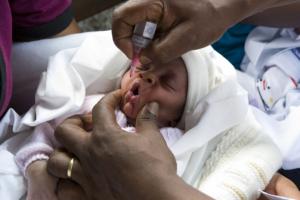Striving to eradicate polio in the African Region
The WHO African Region is reporting rapid progress towards interrupting wild poliovirus (WPV) transmission. Following the steady decline since 2006, only 17 cases of polio have been reported in 2014 compared to 74 cases in the same period in 2013.
For the first time in history, no cases of WPV have been reported in the African Region in over 4 months. In 2014, six cases of polio were reported in Nigeria, five in Cameroon, five in Equatorial Guinea, and one in Ethiopia.
“Much progress has been made in the fight against polio by the Global Polio Eradication Initiative (GPEI), but more efforts by African governments and their partners are needed to ensure that new outbreaks are quickly brought under control and that high immunity levels are maintained in all populations throughout the Region,” said Dr Luís Sambo, WHO Regional Director for Africa.
Understanding polio is very important in the fight against it. Polio is a highly contagious, devastating disease that mainly affects children under five years of age. It invades the nervous system, and can cause total paralysis in a matter of hours.
The virus enters the body through the mouth, multiplies in the gut, and spreads easily via faecal contaminated food and water. Initial symptoms include fever, fatigue, headache, vomiting, stiffness in the neck and pain in the limbs.
One in 200 cases of polio leads to irreversible paralysis. Among those paralysed, 5 to 10% die when their breathing muscles become immobilized. There is no cure for polio, but it can be prevented through a cheap, effective and easily administered oral polio vaccine (OPV).
More than 10 million people are walking today, who would have been otherwise paralysed. It is estimated that more than 1.5 million childhood deaths have been prevented, through the systematic administration of vitamin A during polio immunization activities.
The strategies for polio eradication work when they are fully implemented. Creating community demand has increased access to vaccination and basic health services through a combination of awareness-raising activities related to the disease, its consequences and its prevention.
Stepping up advocacy by international, national and local leaders has helped to build ownership and solidarity for polio eradication across the Region, including for the protection of children against polio, the sanctity of health workers, and the neutrality of health services.
Once polio is eradicated, the world can celebrate the delivery of a major global public good that will benefit all people equally, no matter where they live. Success will mean that no child will ever again suffer the terrible effects of lifelong polio-paralysis.
_____________________________________________
For more information, please contact:
Technical contacts
- Dr Deo Nshimirimana;
Tel: +472 413 9203;
Email: nshimirimanad [at] who.int (nshimirimanad[at]who[dot]int)
- Dr Mbaye Salla
Tel: +472 413 9235
E-mail: sallam [at] who.int (sallam[at]who[dot]int)
Media contacts
- Cory Couillard
Tel: + 472 413 9995
E-mail: couillardc [at] who.int (couillardc[at]who[dot]int)
- Collins Boakye-Agyemang
Tel: + 472 413 9420
E-mail: boakyeagyemangc [at] who.int (boakyeagyemangc[at]who[dot]int)



